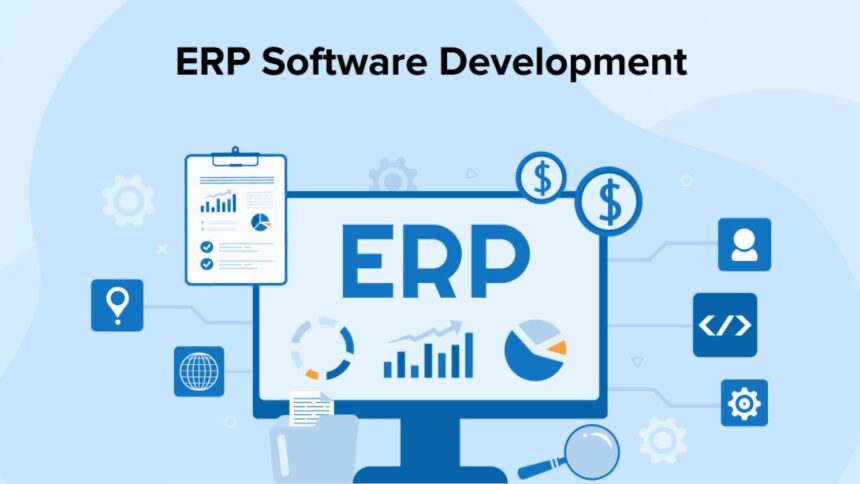Today’s rapid business landscape prompts companies to look for ways to continuously improve effectiveness and productivity. A powerful solution has recently surfaced in the form of enterprise resource planning (ERP) software. These tools merge business operations into a system that simplifies processes. This article delves into how ERP software is transforming business efficiency and productivity.
Optimizing Operations
ERP application provides the perfect solution by combining functionalities like finance management, human resources administration, inventory control, and customer relations. This integration reduces the requirement for systems to simplify operations and eliminate duplicates. For example, in case of dwindling inventory levels, the system can automatically initiate procurement orders, facilitating supply chain processes. This automated process reduces the need for involvement, resulting in decision-making and fewer mistakes.
Enhancing the Precision of Data
Having information is essential for making informed choices in business settings. ERP software helps maintain data uniformity across departments by managing a database that serves as the ultimate reference point for everyone involved. This approach ensures that all departments are working with the set of data and minimizes inconsistencies while enhancing trustworthiness. Data also enhances the reporting functionality, empowering managers to derive insights and formulate strategic plans. As a result of this process, companies can effectively adapt to shifts in the market and respond promptly to customer needs.
Fostering Better Cooperation
Communication and teamwork play roles in the success of any business entity or organization operating within a landscape like today’s business environment. Enterprise resource planning (ERP) systems contribute significantly to enhancing communication effectiveness by offering a platform enabling staff members to access and exchange information. This transparency nurtures a spirit among team members and ensures everyone remains well-informed and aligned with organizational goals.
For instance, the sales team can monitor stock levels in time, thus empowering them to provide accurate delivery estimates to clients. Increased collaboration fosters a cohesive team and boosts efficiency in the workplace.
Fine-tuning the Allocation of Resources
Effective management of resources plays a role in staying competitive in the market landscape today. Enterprise resource planning (ERP) software provides functionalities to monitor and handle resources such as manpower, materials, and machinery. This software enhances visibility into resource distribution, allowing for the identification of resources and optimization of their utilization.
This optimization results in cost reductions and better operational effectiveness. Moreover, the forecasting features in ERPs empower organizations to make plans and distribute resources efficiently, thereby cutting down on wastage and boosting productivity levels.
Ensuring Adherence to Regulations and Mitigating Risks
It’s crucial for businesses to follow industry rules and handle risks effectively. Enterprise resource planning (ERP) systems have tools that monitor compliance and risk management. Automated checks for compliance ensure that business operations meet requirements and decrease the likelihood of facing fines.
Additionally, these systems with smart technologies include security features to safeguard information, lowering the risk of data leaks. By supporting compliance and risk management, ERP applications play a part in creating a more secure business setting.
Ensuring the Ability to Grow and Expand
As companies expand over time and their requirements change, ERP applications are developed to grow alongside the company by adapting to procedures and handling amounts of data effectively. This flexibility guarantees that businesses can still reap the advantages of their ERP systems as they grow further. Also, the customizable features of ERP software enable companies to incorporate new functions or enhance existing ones without causing any disruptions; in ongoing activities, this flexibility turns ERP systems into a wise long-term investment that fosters continuous growth and efficiency.
Enhancing Customer Happiness
Ensuring customer happiness is crucial to the success of any business venture. Enterprise resource planning (ERP) systems boost customer service by granting employees access to pertinent data. For instance, Customer service agents can check order histories and monitor shipments promptly to address inquiries efficiently.
Enhancing inventory management guarantees that products are accessible as required, which helps cut down lead times and increase customer contentment. By providing customer experiences, companies can develop connections with clients and promote loyalty.
In Summary
Enterprise Resource Planning (ERP) software is revolutionizing how businesses operate efficiently and effectively by simplifying processes, boosting data precision, encouraging teamwork, optimizing resource allocation, ensuring compliance, enabling scalability, and enhancing customer happiness.
By combining aspects into one system, these tools provide a comprehensive answer that boosts effectiveness and expansion. As companies progress, ERP systems will become more crucial in helping them stay competitive in a changing market landscape.






